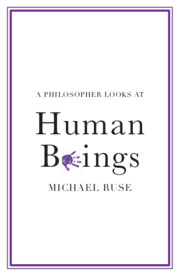I am a human being. What do I, as a philosopher, have to say about this? If I were a physiologist, I would be interested in what makes us tick – how the various parts of the body interact and work together. If I were a sociologist, I would be interested in humans in groups – why are there churches and priests and imams and that sort of thing? I am a philosopher, so what am I interested in and why do I have special authority or knowledge to speak about such things? We’ll pick up on the second part of the question as we go along – the proof of the pudding is in the eating – but I’ll tell you what I am interested in. Why do we humans think we are so special? Do we have good reason for this, or is it just self-deception based on ignorance and arrogance or (perhaps) a fear that we are not so very special?
Let me speak for myself. I once spent a week in Zimbabwe, and I must confess that I came away with a liking for warthogs. They are certainly not the world’s most beautiful animals, but perhaps that was part of the attraction. Out on safari – cameras not guns! – you would see them trotting along in their families, quite content. As the father of five kids, that appealed to me right there. And they weren’t afraid. They would come right up to the Victoria Falls Hotel – the one that King George and Queen Elizabeth stayed in during their trip to Southern Africa in 1947 – and graze contentedly in the grounds. But my liking is accompanied with a kind of smugness. Truly, we humans are not as other animals, or rather there are no other animals comparable with us humans and we are at the top. Warthogs are just fine, but they should know their place. They do not belong at the high table – in a comfortable armchair, looking out across at the Falls, sipping a gin and tonic, boring my wife to tears as I go on about the Royal Family. “If you disapprove of them so much, why do you keep talking about them?”
Am I justified in thinking this about my high status? Try to discount the fact that, like all philosophers, I think I am superior to all others. The brightest people on campus. Return to reality. I love my cairn terriers – Scruffy McGruff and Duncan Donut – more than a lot of humans. But truly, other than my late headmaster, of whom I am prepared to think any ill – a sentiment fully reciprocated – I don’t think my dogs are the equals of other humans. That’s not just the prejudice of an Englishman against the Scots. It’s a question of status, of value, of worth. So much so, that when I am confronted with an appallingly awful human being – like Jeffrey Dahmer, the murderer, who not only preferred to have (gay) sex with his victims after (rather than before) they were dead but who used to cut them up and eat them – my first inclination is to say that such people are not real human beings. They are inhuman.
This is the problem I am going to wrestle with in this short book. What is it that makes human beings special, if indeed they are? My first chapter shows what is to me an amazing paradox, that people who agree about absolutely nothing else – who are in fact often in violent and public disagreement – agree entirely on the high status of human beings. That is a given. This leads into the second chapter, preparing the way for trying to speak to the beliefs of those in the first chapter. Science is going to be the key, but before we get to the actual science, we must dig into the underlying metaphysical presumptions that people bring to their science. These, we shall see, are a crucial element in the stew. Third, we turn to the science, what one might call the dominant position or paradigm of today, Darwinian evolutionary theory. We shall find out what it has to say about humans. Fourth and fifth, we shall evaluate its conclusions by circling back to the metaphysical assumptions unveiled in Chapter 2, starting to approach understanding of the positions taken in Chapter 1. Sixth, I shall take up the question of progress, trying to see if the different approaches really are so very different.
This leads to the all-important seventh and eighth chapters, where I show that what has gone before is very much more than a sophisticated exercise in navel gazing. Here the personal and professional come together and I show why I very much wanted to write this book. I was born in the British Midlands in 1940, shortly after the beginning of the Second World War. My parents were Quakers, and it was within that faith I was raised. Quakers are pacifists. They also have no dogmas. This does not mean they have no strong beliefs. They can equal the Jesuits on this. Try them on the “inner light” or “that of God in every person.” But you – and that means starting as children – with the helpful guidance of older Friends (Quakers), must work these things out for yourself. Unlike the First World War, the Second World War was a “good” war, in that it had to be fought. Hitler had to be stopped. Can one be a pacifist in such a situation? Should one be a pacifist in such a situation? These questions were and are a major reason why I have been a life-long professional philosopher. What should I do? Substantive ethics. Why should I do what I should do? Metaethics. What help does the discussion of the earlier chapters offer towards an answering of these questions? A philosopher looks at human beings, indeed!
